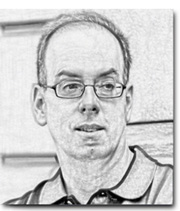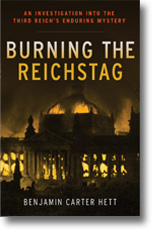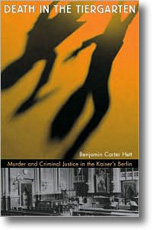| Benjamin Hett (212) 772 4382 | bhett@hunter.cuny.edu |
| CV |
|
|
Benjamin Hett Professor of History Hunter College ---
|
Research
Until recently my research has focused on the intersections of law, politics, and popular media in twentieth-century Germany. I am now shifting more into certain aspects of the Second World War and their legacies. My first book, Death in the Tiergarten: Murder and Criminal Justice in the Kaiser's Berlin (Harvard UP, 2004) dealt with what I call the "courtroom culture" of Berlin in the years between 1891 and 1914. The book looked at a number of criminal trials and examined how lawyers, judges, prosecutors, defendants, witnesses, politicians, and the press understood themselves and what they were doing in the criminal court. By studying changes in practice and outcomes over time, I argued that a significant liberalization was underway in the courts and the broader culture well before the outbreak of war in 1914. My second book, Crossing Hitler: The Man Who Put the Nazis on the Witness Stand (Oxford UP, 2008), was a biography of the Weimar-era German trial lawyer Hans Litten (1903-1938), who became famous through his devastating 1931 cross-examination of Adolf Hitler. Through a study of LItten and his career, as well as Litten's subsequent fate in the concentration camps of the Third Reich, I argued that the justice system of late Weimar was neither as judge-driven nor as consistently hostile to the political center and left as previous accounts have made out. In fact the very strenght of the rule of law before 1933 explains the gradual rather than sudden corruption of it under the Nazis. My third book, Burning the Reichstag: An Investigation into the Third Reich's Enduring Mystery (Oxford UP), will be appearing around the beginning of 2014. The Reichstag Fire was the moment at which Hitler and the Nazis were able to consolidate their power and move from a still-shaky coalition government to something approaching absolute power. Ever since 1933 an often very bitter controversy has raged over the question of "who did it" — did the Nazis themselves set the fire, to create a pretext for draconian legislation, or did the Lee Harvey Oswald-esquw, three-quarters blind and half-mad Dutch anarcho-Communist Marinus van der Lubbe act alone? I became interested in this subject in the latter stages of my work on Hans Litten. Litten was arrested the night of the Reichstag Fire, ans I spent some time trying to pin down the paper trail of his arrest. Most people simply assume he was arrested because he had drawn Hitler's hatred, but I wanted to see the evidence. This research led me into the controversy over when the arrest lists used that night were drafted. I began to be interested in the larger debate over the Reichstag Fire and its serious implications for understanding how and why the Nazis came to power — and the implications of the controversy itself for helping to understand how Germans "came to terms with the past" from the 1940s to the 1960s. In the course of doing this research I had the opportunity to see a number of sources to which historians of this subject had not previously been able to gain access. The book will bring out some new evidence about the fire itself, but perhaps more importantly, some new and rather shocking information about the nature of the controversy in the 1950s and 1960s. It is as much a meditation on how our history gets written — the mix of politics and interests that shape even academic research — as it is about the events of the fire itself. I am now moving into new projects. The main one is about the siege of Leningrad during the Second World War, a story that is generally (and understandably) told from the standpoint of the citizens of Leningrad who endured a 900-day blockade from 1941-1944. I am interested in combining the Russian and German perspectives and in studying, among other things, the experiences and outlook of the German soldiers on the Leningrad front. I by no means want to neglect the Russian sources either, and to this end I am coming to grips with learning to read Russian — a task for which I am much too old! — but which I am enjoying nonetheless. До свидания.
|
|




